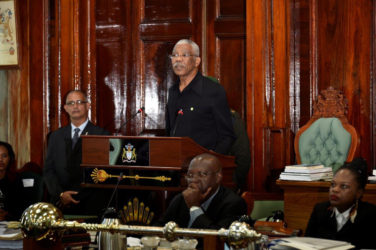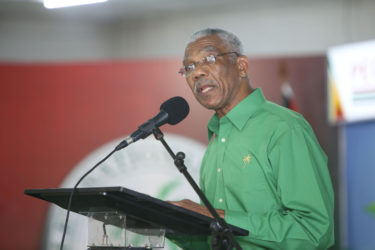Politics
Your Government entered a depressing financial landscape in May 2015. The economic legacy that this nation inherited was characterised by a lack of strategic planning and whimsical decision-making. The absence of a policy to provide employment opportunities for youth and to reduce extreme poverty and the failure to energise the manufacturing sector weakened the economy.
Economic mismanagement was accompanied by huge debts for unpaid international obligations and court judgements.

The most grave financial problem was the bankruptcy of the Guyana Sugar Corporation (GUYSUCO) which owed $89 billion in debts. Your Government was forced to divert money from economic development and social projects to rescue the ailing corporation with an immediate injection of $12 billion. An additional $11 billion had to be provided the next year, 2016, making a total of $23 billion bailout in 18 months.
These transfers exclude the servicing of GUYSUCO’s debts in respect of the Skeldon Estate Modernisation Project – a monstrous and monumental US$ 200 million mistake and, probably, Guyana’s single most costly industrial catastrophe of all time.
Paddy farmers in the rice industry were not spared the previous administration’s reckless mismanagement. The PetroCaribe Fund – used to meet payments to farmers for rice and paddy shipped to Venezuela – contained less than US$1 million in May 2015. Your Government was forced to make available nearly $4 billion immediately so that poor paddy farmers could be paid.
Your Government inherited a large number of liabilities, including judgements in excess of US$34 million (or G$7 billion) in favour of NH Elias, in respect of the East Bank Demerara Road; judgement for $1.3 billion in favour of Rudisa Beverages; judgement in favour of Trinidad Cement Limited; settlement for $1.4 billion with B.K. Tiwari on Haags Bosch Project and several other judgements that will cost the State over $1 billion.
Your Government, also, was obliged to provide another $5.4 billion bail out the National Insurance Scheme as a consequence of the previous administration’s irresponsible CLICO investment.

Your Government, despite encountering this immense mountain of debt, was able to meet commitments to the nation’s hard-working public servants. The minimum wage grew from $39,520 in May 2015, to $55,000 in January 2016, an increase of 39.2 per cent in 7 months.
Public servants have benefitted, in addition, from the raising of the tax threshold, from $600,000 in May 2015 to $660,000 in January 2016; the removal of income tax from workers’ contributions to the National Insurance Scheme and a tax-free payment of $50,000 to all workers earning less than $500,000, in December 2015.
These benefits, taken together, augmented workers disposable income significantly. Collective bargaining with public servants’ unions could result in additional benefits in the form of increased increments, allowances and adjustments made for ‘de-bunching’. Old-age-pensions have been increased from $13,120 to $18,200 or by 38.7 per cent, and Public Assistance increased by 24 per cent during the same period, May 2015 to April 2016.
Environmental policy
Your government’s overarching objective is to ensure a ‘good life’ for all of our citizens. We have chosen a ‘green’ pathway to achieve that higher ‘quality of life’.
Guyana’s ‘green agenda” is a comprehensive, multi-sectorial development programme. It is not limited narrowly to low-carbon initiatives but is a broad-based development programme, which incorporates:
-management of our unique biodiversity;
– management of our vulnerable coastal zone and our valuable protected areas; and,
– management of solid waste and sanitation.
Guyana’s ‘green agenda’ will promote ‘green’ economic sectors such as the development of climate-resilient agriculture, ecotourism and information communications technology and promote renewable energy generation. It will ensure a diversified and resilient economy while promoting ‘green’ growth and ‘green’ employment and secure a clean and healthy environment for future generations.
Your Government announced, on 1st October 2016 – National Tree Day, the establishment of the Department of the Environment within the Ministry of the Presidency. The Department will ensure more effective communication, cooperation and coordination among the agencies concerned with climate change, energy generation, environmental protection, forest conservation, national parks, protected areas, rivers and wildlife protection. The Department has been tasked with developing a master plan to achieve the objectives of the ‘green agenda’.
Guyana established itself as a global leader on the environment as early as 1989. We accorded to the international community the use of 371,000 hectares of our forests – an area larger than Malta – for research into the sustainable management of forest resources.
The Iwokrama International Centre for Rainforest Conservation and Development (IICRCD) remains in the vanguard of our campaign to conserve our forests, to counter the adverse effects of climate change and to conduct research into our rich biodiversity.
Iwokrama will be the site, from the next financial year, for the establishment of an international institute for biodiversity. The institute will allow local, regional and international students to research out rich and diverse flora and fauna.
We will set aside, also, an additional two million hectares of forests and wetlands for conservation, in accordance with the commitments we made under the Paris Agreement on climate change. Protected areas will be established in every Administrative Region of Guyana.
Environmental degradation caused by reckless logging and mining remains a source of concern. We will continue the process of reclaiming mined-out areas in our country and of restoring the ecological integrity of our forested areas.
Loggers and miners will be under a legal obligation to ensure sound environmental practices. Your Government will reboot the fledging ecotourism sector in 2017. Our unmatched biodiversity is a world-class product which will allow us to create a globally-competitive ecotourism sector.
Public infrastructure
Public infrastructure, connecting our hinterland communities to each other and to the coastland, is pivotal to the development of the ‘green’ state. Our ecotourism destinations are located in the hinterland. Infrastructure is needed to access these attractions.
We will continue to advance, in 2017, initiatives for climate adaptation. A programme to bolster and better manage and maintain our sea defences will be developed with our international partners. It will form part of the matrix of measures in the 2017 National Budget. We will guard, also, against the effects of flooding by strengthening our drainage systems, particularly along the coastland. We will also counter the effects of prolonged dry weather on our wildlife by establishing protective sanctuaries for them.
Your Government will intensify its improvement of aerodromes, bridges, roads and stellings in order to enhance communication between the hinterland and coastland. We will begin negotiations with national and international parties to build a bridge across the Essequibo River in 2017.
We aim at improving the pace of economic development by removing bottlenecks to the implementation of infrastructural projects. Planning units will be established within ministries. National procurement procedures will be strengthened to address the institutional deficiencies which led to poor implementation and monitoring of public infrastructural projects.
Public contracts are a key concern. We will seek international support to streamline our procurement systems and methodologies within Ministries and Budget agencies. A Bid Review Committee has been established and has begun work. The Public Procurement Commission will soon be brought into existence to improve the integrity of public procurement.
Public telecommunications
Your Government established the Ministry of Public Telecommunications in January 2016. We are proud of having passed legislation which will allow for the further liberalization and modernization of Guyana’s telecommunication sector. We will extend telecommunication services to all ten regions.
The e-governance programme will eventually network all government agencies and will facilitate efficient data-sharing between government agencies. This network will then be extended to citizens so that they can access government services online. Information communication technology (ICT) is integral to our ‘green agenda’. It will become a major driver of economic diversification.
Internet connectivity of government buildings will be extended. Every government building – including airports, hospitals, markets, police stations, post offices and schools – will have access to the internet in coming years.
ICT will impact positively on our educational system. We have reconfigured the One Laptop per Family (OLPF) Initiative into the One Laptop per Teacher (OLPT) Initiative in order to allow our teachers – the guardians of quality assurance in education – to be better equipped to improve educational attainment in our schools.
We will continue the nationwide distribution of computers to our teachers – an initiative which commenced, appropriately, on 5th October – World Teachers Day.
Public security
Your Government intends to make Guyana safe for this and future generations. We will do so not only by combatting crime and criminals but in uprooting the causes of crime and its links with transnational crime.
We established a National Security Committee. We are in the process of establishing a new National Anti-Narcotics Agency (NANA) to address the mother of all crimes – the trafficking in narcotics. We will establish a new National Intelligence and Security Agency (NISA) to ensure better surveillance of our borders and coasts.
We have taken a decision, also, to re-engage the United Kingdom with a view to restoring the aborted Security Sector Reform Action Plan (SSRAP). The Plan will commence soon with the arrival of experts from the United Kingdom to advise us on crafting a national security response to domestic and transnational crime – including narcotics-trafficking and gun-running.
Aerial surveillance over the maritime zone over the past year led to a reduction in the incidence of piracy. We will continue to augment the Guyana Police Force’s Marine Branch.
The Mounted Branch will also be expanded to enable it to conduct patrols in the savannahs and back-dams, which are not easily accessible by vehicular patrols. The Corps of Wardens will enforce the law with regard to mining, logging, hunting wildlife and trafficking in persons in the hinterland.
The ‘green’ economy will require significant new local and foreign investment. We recognize the importance of human safety, a secure environment and legal framework for attracting such investment. We want to protect our citizens, fisher folk, households and farmlands.
Public services
Public services – including cultural development, education, health, justice, recreation, security, sport and social protection – are provided by the state. The provision of quality public services forms the basis for increased opportunities and well-being of citizens and communities.
Public services must be accessible to every citizen, in every town, in every Region. No citizen should have to leave her or his Region in order to access public services. We will accelerate the decentralization of public services alongside the development of ‘capital towns’ in 2017.
The provision of quality public services is associated with enhancing the ‘quality of life’ of citizens. We are mindful of the need to improve public administration to make public services more accountable, accessible and affordable.
Continuous training and filling resource gaps in the public service will be integral to the process of reforming our system of public administration. We will improve the professionalism of the public service in 2017.
The establishment of the Public Service Staff College will enable the training of a corps of public officials who will be better equipped to ensure quality and timely delivery of public goods and services. Attention will be paid to filling human resource deficits, particularly in our rural and hinterland regions.




